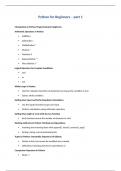Summary
Summary Python for Beginners – part 1
- Course
- Institution
This is the beginner guide for python programming this is the 1st part and the 2nd part will be uploaded soon and there will be package in this and this gives knowledge to start python programming and this is the 1st step all should take because after this i will post python programming crash cours...
[Show more]



